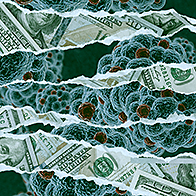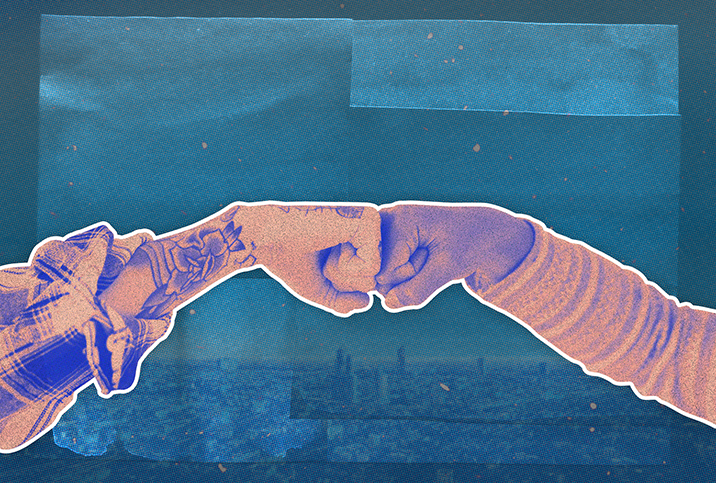Sex Workers Are Some of the Most Influential HIV Activists

In March, award-winning porn performer Vanniall came out as HIV positive.
"The reason I spoke out is because I knew from the moment I heard the diagnosis that I wasn't the only person dealing with this," she explained. Despite this knowledge, she confessed to feeling "alone, confused and scared."
These fears slowly disappeared as she learned more about what it means to be HIV positive in 2022. Thanks to decades of tireless activism and treatment advances, HIV is no longer a death sentence. Vanniall wasn't reassured of this fact by her doctor, though. Instead, her doctor "just said, 'Sorry,' and handed me a pamphlet," she recalled.
This lack of knowledge and sympathy galvanized Vanniall to write a passionate yet educational essay, which explained that she now takes regular medication to reduce her viral loads to "undetectable" levels. At these levels, HIV can't be transmitted to a sexual partner, even through unprotected sex. Drugs such as the preventive PrEP, or pre-exposure prophylaxis (also known under the brand names Descovy and Truvada), and PEP, a kind of HIV "morning after" pill, have revolutionized HIV care.
As a Black, transgender sex worker, Vanniall's story provides vital representation in the world of HIV activism, which predominantly centers on white, cisgender, gay stories. Her arguments for change also impacted the porn industry in general. For years, sex workers have been fighting to persuade industry heavyweights to sign the PPSD Pledge, an anti-HIV discrimination pledge put together by sex workers. Just a few weeks after Vanniall's essay was published, PASS—Performer Availability Screening Service, the porn industry's official testing body—signed the pledge, indicating there's more progress on the horizon.
There's still work to be done, but these breakthroughs remind us of a key fact: Sex workers have always played a vital role as HIV activists.
The history of stigma
In 1864, the Parliament of the United Kingdom passed a law known as the Contagious Diseases Act. Initially proposed to tackle the transmission of venereal diseases, the legislation quickly devolved into an outright attack on sex workers.
The law allowed police officers to arrest any woman they suspected of being a sex worker and to forcibly subject her to disease testing. The law initially applied to only a handful of naval ports, but a series of revisions led to its spread across the country. By 1869, the law was enacted in the majority of the country. If a woman was found to be infectious, she was locked away to apparently "protect" military men from contracting diseases. These periods of detainment in "lock hospitals" initially came with a three-month maximum sentence, but by 1869, the maximum period had been extended to one year.
This framing of sex workers as disease vectors has reared its head sporadically throughout history, but particularly so in the mid-1980s. By this point, according to a 1990 report published in Sociology of Health & Illness, it was common knowledge that HIV/AIDS wasn't just a "gay disease." As a direct result, "other groups became candidates for scapegoating. Women prostitutes apparently fitted the bill nicely," the report stated.
Some sex workers were accused of spreading HIV. In other cases, anti-porn lobbyists seized the opportunity to drum up moral panic and make life more difficult for sex workers than it was already—no mean feat, considering their existing obstacles of poverty, criminalization and police violence.
Mutual aid as activism
As the death toll of the AIDS crisis continued to rise, sex workers quickly realized the importance of mobilizing. COYOTE, or Call Off Your Old Tired Ethics, was founded in the 1970s by Margo St. James, and thanks to its annual Hookers Ball fundraising event, it was one of the best-known sex work activist groups worldwide at the time.
Governments weren't funding AIDS research, and they certainly weren't funding sex education. Sex workers stepped up as HIV advocates instead.
Not only did sex workers hold informal education sessions, they also handed out condoms and spoke openly about sexual health with their clients. In the mid-1980s, they designed and conducted research that went on to be known as the "Prostitute Study" in conjunction with researchers at the San Francisco Medical Center. The survey of 180 women in San Francisco revealed that sharing needles was the top cause of HIV transmission among women, a discovery that predated scientific understandings of transmission at the time.
In 1984, CAL-PEP––the California Prostitutes Education Project––was established in the San Francisco Bay area, offering services such as HIV testing, needle exchanges and more to sex workers. The core premise was harm reduction through a number of public health policies with the goal of lessening the negative physical and/or social consequences associated with various human behaviors. Harm reduction is a field in which sex workers have always been experts. In some countries, governments worked closely with sex workers, providing them with condoms and enlisting them to educate clients.
These historical contributions are too often minimized or ignored completely.
"We see it happen all the time," said Jason Domino, a London-based activist, sex worker and organizer partly responsible for the PPSD Pledge. "The likes of Marsha P. Johnson and Sylvia Rivera were sex workers, but that fact is almost always erased. We've been there throughout the history of HIV activism. Sex workers were cleaning HIV clinics and hospitals as a way of raising awareness and providing specific care within their own communities."
Johnson and Rivera were American gay liberation and transgender rights activists, and both prominent veterans of the Stonewall Inn uprising from June 28 to July 3, 1969, in New York City.
Building on activist legacies
This activism continues today. In 2017, the United Kingdom's National Health Service agreed to fund PrEP medication on a trial basis. Sex workers played a key role in this victory, banding together to fund initiatives like Porn4PrEP, a project founded by porn actors and aimed at improving awareness of HIV and other sexually transmitted infections (STIs) while also tackling stigma. Domino was instrumental in getting this project off the ground and remains a vocal advocate for the use of polymerase chain reaction (PCR) tests for HIV in the porn industry.
"Sex workers were doing a huge amount of work at the time and they were potentially sacrificing a lot of their erotic capital by talking about these issues," Domino explained.
Even now, he added, sex workers risk losing fans, followers and paid subscribers by talking about "unsexy" political issues such as HIV.
"I noticed performers saying these were conversations you probably don't want to hear from someone you want to see solely as a sexual fantasy," Domino said. "A lot of people risked their income in a way I don't think should be overlooked."
'Sex workers were doing a huge amount of work at the time and they were potentially sacrificing a lot of their erotic capital by talking about these issues.'
Discriminatory policies can facilitate the erasure of sex workers on the frontlines of HIV activism.
"You can't even really make the connection in public media," Vanniall explained. "In the U.S., you can't get federal funding unless you explicitly make a pledge against sex workers. They don't want us to make these connections, but it's about time that we do."
Initially passed in 2003, a U.S. law stipulates that HIV/AIDS organizations have to comply with a self-explanatory "anti-prostitution pledge" to receive federal funding. There have been a handful of legal battles over the pledge since then. In a 2013 case, the Supreme Court ruled that the pledge infringed upon the free speech rights of U.S. organizations. This ruling didn't change much, though, and in 2020, another Supreme Court ruling upheld the need for foreign affiliates of U.S.-based health organizations to require the pledge.
These battles continue, but sex workers remain on the frontlines as HIV activists today.
"To erase trans, black, non-default people—such as sex workers—has been hugely detrimental to the HIV conversation," Vanniall explained. "You have to include everyone because there's a lot of people dealing with it in this world. At the minute, there's a lot out there to make it seem like the only people who need to worry about being affected are cis, white, gay men. That narrative is wrong and it needs to be changed. It needs to be changed now."




















